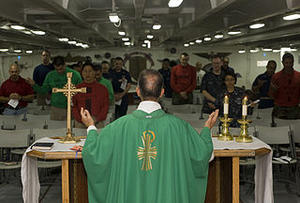Government shutdownShutdown affects U.S. military religious services
A shortage of active duty Catholic chaplains has led the government to hire contract priests to offer religious services in the military. As a result of the government partial shutdown, the military has furloughed as many as fifty Catholic chaplains. They were not allowed to celebrate weekend Mass, and some were told that they would not be allowed to volunteer their services. Catholic organizations said they were outraged by the decision, which some saw as an expression of what they described as the administration’s animus toward Catholics. Observers note, however, that the Anti-Deficiency Act (ADA), which codifies the Constitutional requirement that the executive not draw money from the treasury unless authorized by Congress, specifically restricts acceptance of voluntary services or personal services beyond authorized levels “except for emergencies involving the safety of human life or the protection of property.”

Catholic priests barred from celebrating mass during the shutdown // Source: commons.wikimedia.org
The U.S. government shutdown is affecting religious services in the U.S. military, as the military has furloughed as many as fifty Catholic chaplains because of the partial government shutdown.
The furloughed chaplains were not allowed to celebrate weekend Mass, and Todd Starnes reports for Fox News that at least one chaplain was told that he would be subjected to disciplinary action if he engaged in ministry activity.
The Archdiocese for the Military Services said the military installations affected are served by non-active-duty priests who were hired as government contractors to offer religious services. Archbishop Timothy Broglio of the Archdiocese for the Military Services told Fox News that the contract priests were also forbidden from volunteering their services.
“They were told they cannot function because those are contracted services and since there’s no funding they can’t do it — even if they volunteer,” he said.
John Schlageter, general counsel for the archdiocese, said in a written statement that furloughed priests volunteering their services could face legal trouble. “During the shutdown, it is illegal for them to minister on base and they risk being arrested if they attempt to do so,” he said.
Ron Crews, executive director of the Chaplain Alliance for Religious Liberty, described the ban on contract chaplains disturbing.
“Catholic military personnel should not have their religious liberties held hostage by this funding crisis,” Crews told me. “I find it alarming that these priests cannot even volunteer to provide services without threat of arrest.”
Some saw the ban on contract priests as an expression of what they descried as the “animus [of] this administration” toward Catholics. Thus, Bill Donohue of the Catholic League told Starnes that he was not surprised by the decision to furlough Catholic priests. “For them to deny Catholic men and women the opportunity of the sacraments and to deal with their prayerful vocations is really a stunning statement.”
He chalked it up to meanness.
The decision to ban contract priest from offering their services, even voluntarily, may be the result of more prosaic consideration having to do with the Anti-Deficiency Act (ADA), though. The ADA codifies the Constitutional requirement that “No Money shall be drawn from the Treasury, but in consequence of appropriations made by Law.” Federal officials are prohibited from entering into contracts, incurring obligations, or performing activities without having a current appropriation. ADA specifically restricts acceptance of voluntary services or personal services beyond authorized levels “except for emergencies involving the safety of human life or the protection of property.”
